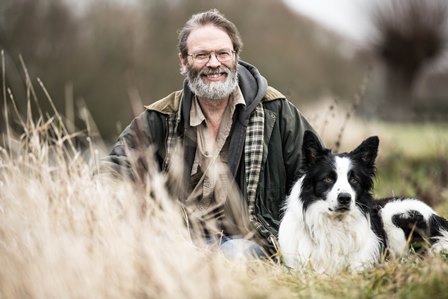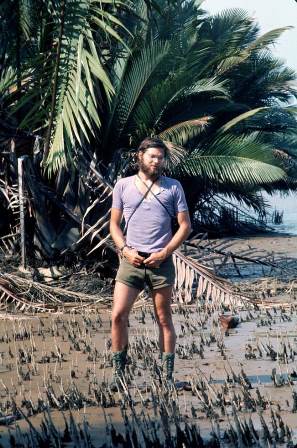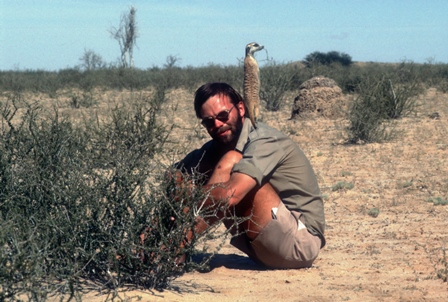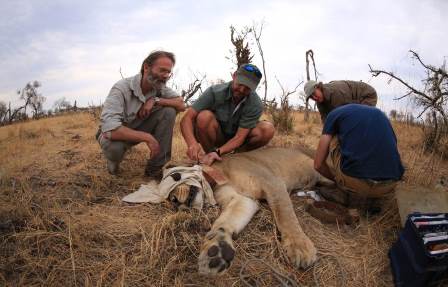News
Search for world’s greatest conservation scientists: David Macdonald, founding Director of Oxford’s WildCRU named as global finalist for lifetime Award for Conservation Excellence
Conservation Scientist David Macdonald Nominee for Prestigious Honour
David Macdonald, Oxford University’s first Professor of Wildlife Conservation, is accustomed to his work being in the limelight. The BBC TV documentary about his doctoral thesis, The Night of the Fox, was a finalist for a BAFTA award, his work on meerkats in the Kalahari led to another BBC documentary, Meerkats United, said some years later to have been watched by 500 million people around the world, his six-part BBC documentary on carnivores, The Velvet Claw, was screened in every TV territory in the world, and in 2015 when Cecil, the lion his team was tracking by satellite hit the media, an estimated 4.4 million people visited his website in one night. Now, he has been nominated as a finalist for a remarkable new distinction, The Award for Conservation Excellence (ACE) to be awarded this year for the first time, and created to recognize “the extraordinary contributions made to wildlife conservation by the world’s leading scientists”.
The award will be presented by The Banovich Wildscapes Foundation, which was founded in 2007 by artist John Banovich, an American oil painter known internationally for his portrayals of wildlife. The first ever ACE recipient will be announced at a ceremony during the Southeastern Wildlife Exposition on February 14, 2018 at the Gaillard Center in Charleston, South Carolina, and will be awarded a $100,000 cash prize. Professor Macdonald says, if he wins, he will split the money between a field study, probably of pangolins, cruelly persecuted for illegal trade, and sponsoring a doctoral studentship on the impact of the human population explosion on wildlife – amongst a suit of topics “for which biology is necessary but not sufficient” for which he is desperately trying to raise funds under an initiative he calls “Conservation-led development”.
Reacting to news of being selected from a list of 40 nominees, Macdonald is quoted on the ACE website as saying “Of course people who know little of conservation imagine it to be a cosy and cuddly subject, but that is not the understanding of anybody who appreciates that conservation is actually about how people in the 21st Century (8 billion or so of them, from peasants to presidents) wish humanity to live alongside wildlife and the environment, and hence is about deep choices that affect every single citizen – this is not easy stuff!”. He added, explaining the challenging work of the WildCRU, the Unit at Oxford University that he founded and still Directs, that “it is difficult enough to be interesting, but it’s a great deal harder to be useful”.
Macdonald came to Oxford in the week of his eighteenth birthday to read Zoology. In 1986 he was instrumental (through what he terms a lifetime of professional begging) in creating at Lady Margaret Hall, the first senior Research Fellowship explicitly in wildlife conservation in any university in the world. Appointed to that post, he created the WildCRU, Oxford’s Wildlife Conservation Research Unit, widely considered a world leader amongst the many such groups that followed Macdonald’s pioneering lead.
David Macdonald’s research spans animals from butterflies to big cats, and is highly inter-disciplinary – his recent papers expand from ecology to environmental law, geopolitics and ethics. He has just returned from Myanmar where he is working on clouded leopards and tigers, and where he ran a workshop devising a national Tool Kit for the protection of these charismatic cats within a framework of forest protection.
In 2004 Queen Elizabeth II appointed David Macdonald Commander of the British Empire (CBE) for ‘services to science’, and in 2014, thanks largely to the residential Oxford University Diploma he created at the WildCRU to train young conservationists from Developing Countries, the Unit was awarded the Queen’s Award for Higher Education. Thanks to a gift from the Tubney Trust, the WildCRU is based at Tubney House where David’s close friend and philanthropist, Tom Kaplan and his wife Daphne, created the Recanati-Kaplan Centre which now houses a team of some sixty conservation scientists with many more scattered in remote wildernesses around the world.
David Macdonald was selected as a finalist for the ACE award from 40 world-class nominees. Of the other finalists, three hail from New York’s WCS (Ullas Karanth, Joel Berger and a duo Tim McClanahan & Nyawira Muthiga), and George Archibald (Co-Founder, International Crane Foundation). Macdonald said, “This is an inspirational group, most of them are already my friends, and whoever emerges as first amongst these equals, we will all surely carry forth the banner of conservation”. Asked for his reaction to this nomination for a lifetime’s effort, he answered “I’ve always fretted over what to do when I grow up – and now I feel about ready to start, so this is a beginning not an end. In my case, while still enchanted by the earthy research that’s brought me to this nomination, I am now determined to combine it with topics beyond biology to set a conservation agenda from groundedness to geopolitics”.
The mission of ACE is to honor and appreciate a legacy of conservation through recognition of men and women who share their passion to conserve the great outdoors, and have made extraordinary contributions to the sustainability of nature and wildlife. The Award will recognize a conservationist’s long-term commitment to making our planet a better place, and empower people in both local and international communities to advance wildlife conservation.
-
 Professor David Macdonald and Fly in Oxfordshire
Professor David Macdonald and Fly in Oxfordshire -
 A lifetime in conservation: David Macdonald, aged 20, in Borneo working as a cameraman for David Attenborough while studying proboscis monkeys
A lifetime in conservation: David Macdonald, aged 20, in Borneo working as a cameraman for David Attenborough while studying proboscis monkeys -
 In the Kalahari desert making Meerkat's United, subsequently voted by a UK telethon the most popular Natural History film ever made
In the Kalahari desert making Meerkat's United, subsequently voted by a UK telethon the most popular Natural History film ever made -
 In Zimbabwe, fitting a satellite transmitter to a lioness as part of a programme to safeguard the well-being of both lions and the local people whose cattle they eat
In Zimbabwe, fitting a satellite transmitter to a lioness as part of a programme to safeguard the well-being of both lions and the local people whose cattle they eat





